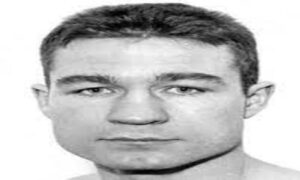Ringside Report Looks Back at Boxer Mickey Hughes
By Donald “Braveheart” Stewart
As the debate over boxing being in the Olympics rages, in the UK we are reminded constantly of the pedigree of our boxers who went to the Olympics and returned as Olympians but also as medalists. It appears, constantly, that this form of amateur success is either a guarantee of riches in the professional game or the level of pressure under which most simply should buckle.
Now that we have a fully professional set up for British boxers to compete and become Olympians, it is expected that any fighter who has something round their neck after an Olympic Games is likely to have enough media attention to make their fortune. But it took James DeGale to become the first Olympic Gold medalist in UK boxing history to become a professional world champion. He went to the London Games in 2012, so that process of transferring your pugilistic prowess from one code to another has not always been as simple as recent history suggests. In fact, up until Amir Khan, as fresh faced 17-year-old, in Athens in 2004 made the grade, we were pretty poor in seeing the Olympians shine in the professional ranks in the UK. There were exceptions, but that is precisely what they were – exceptions. The Olympics before, in 2000, Audley Harrison had become the first British boxer to win gold in the super heavyweight division, but his professional career had begun with more emphasis on the contracts he was getting than the opponents he was facing – it was not a sparkling example of Olympians scaling heights.
And so, in 1984, British boxing ended up in Los Angeles for the Olympics with a number of boxers who were not going to challenge much for world honors, after they left the amateur code. Mickey Hughes, 24-7- 21 KOs, made more than a decent fist of it. In fact, it could be argued that in looking for the headlines we lose the real stories as Hughes’ own story is testimony to.
Born in the capital, London, Hughes competed at welter to light middleweight throughout his career. He was the 1984 Amateur Boxing Association of England (ABA) welterweight champion, representing the St. Pancreas Amateur Boxing Club.
At the Olympics, Hughes boxed Paul Rasamimanana of Mauritius, beat him and then came unstuck against Rudel Obreja of Romania. The medal haul from the Olympics for the UK in boxing was pretty poor – one bronze at super heavyweight. Expectations, to be fair, were not that high.
As a professional, Hughes turned professional on the 1st of October 1985, making his debut against Steve Tempro in Wembley Arena. In a professional career spanning 31 fights, he went on to fight for the Southern Area championship, and to win British and Commonwealth championships as well as being a WBA intercontinental challenger. He made headway in the sport, but just like in the Olympics, fell short of full honors.
His first fight for a belt came on the 28th of September 1989 in Battersea when he was stopped by Trevor Smith in the 6th round of a scheduled 10 rounds.
But he also broke Scottish hearts, when he devastated Gary Jacobs in a fight that Eddie Hearn has described as the best, he has ever seen at the small hall mecca of UK boxing, York Hall. Gary Jacobs was a huge Scottish prospect. Raised around the legacies of Scottish fighters of the past we were hungry for a new champion. Jacobs was the good-looking poster boy. On the 17th of October 1990, he went in against Hughes in a British title eliminator and up north in Scotland we thought it was going to be a formality. Mickey Hughes had a different agenda and did not reveal it till the eighth round. Teddy Atlas was in Jacobs’ corner that night and over 7 rounds, Jacobs was in the lead. All was going well; we were all ready for the next phase in this young man’s career.
Then, in the 8th, Hughes, with trouble over his eyes and deadly intent within them unleashed a left hook that sent Jacobs to the floor and scattered his dreams across the canvass. Four months later, Hughes was back in York Hall to take that British title in the 9th round when he stopped Ian John Lewis, us Scots thought should have naturally been Jacobs!
Hughes continued on an upwards trajectory. But the1990s were not to be kind. On the 4th of June 1991,back in York Hall Hughes lost a Commonwealth title fight to Donovan Boucher, then lost a British title fight 5 months later in the same venue when he was stopped in the 3rd round by Del Bryan. In 1992, he was to win that Commonwealth belt when he won on points against Craig Trotter on the 5th of September in Crystal Palace.
Then on the 30th of January 1993, Hughes went in against Lloyd Honeyghan for the Commonwealth belt in Brentwood and came away empty handed – stopped in the 5th round. It led to his final fight 3 months later, in April, in Brentwood again where he lost a WBA intercontinental fight against Shaun Cummings. He retired afterwards.
As an Olympian, you enter an elite band of people. It guarantees nothing except expectations, but for fighters like Mickey Hughes it can bring opportunities. Hughes grabbed as much as he could, but his record and his career is one worthy of thought, because like most fighters, the struggles in training are as equal to the journeyman as they are to the champion. Hughes proved he was worthy to the task and to the respect earned form us all.
Click Here to Order Boxing Interviews Of A Lifetime By “Bad” Brad Berkwitt


